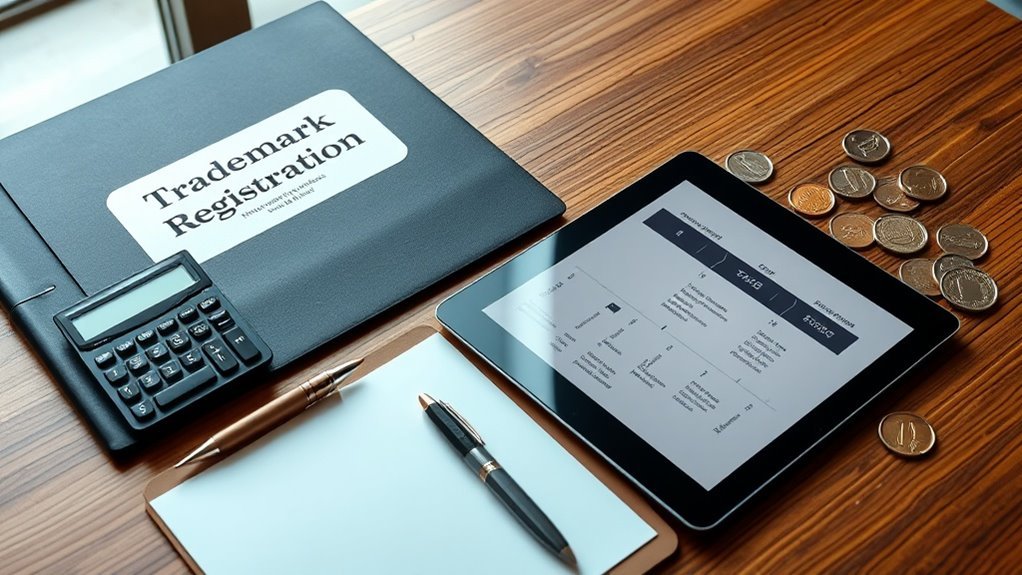Cost and Timeline for Trademark Registration in India
The process of trademark registration in India is governed by specific laws and regulations that ensure the protection of intellectual property. The registration process typically spans about 6 to 12 months, which includes a 1 to 3 month examination period. Following this, there may be a 4-month publication phase where objections can be raised by third parties.
During the examination phase, the trademark application is reviewed to ensure it complies with legal requirements. It is vital for applicants to respond promptly to any queries raised by the authorities to prevent any delays in the registration process. Understanding the procedures and requirements is crucial for a successful trademark application. If you want to delve deeper into the registration process, there is much more to explore!
Key Takeaways
- The process for trademark registration in India varies based on the type of applicant, such as individuals, startups, or larger entities, which influences the overall structure of the application.
- The typical duration for completing trademark registration can extend from 6 to 12 months, contingent upon the processing of applications and any potential objections that may arise.
- Examination of trademarks usually takes place within 1 to 3 months following the submission of the application, after which there is a publication period lasting 4 months.
- Additional requests for information from the Trademark Office may introduce delays in the registration process, necessitating prompt responses from applicants.
- The complexity of the application may lead to the involvement of professional services, which can be an additional consideration during the registration process.
Understanding Trademark Registration in India

When navigating trademark registration in India, many individuals often find the process to be quite complex.
It’s common to feel overwhelmed by the extensive paperwork and intricate legal terminology. Therefore, grasping the fundamentals is crucial. A trademark represents your brand’s identity and plays a key role in distinguishing your goods or services from those offered by competitors.
Essentially, it acts as a legally protected sign that can manifest in various forms, including words, logos, or slogans.
Prior to submitting your application, it’s essential to perform a trademark search to verify that your preferred mark isn’t already registered or in use by another entity. Understanding the importance of trademark searches can prevent potential legal disputes down the line.
Once you have confirmed the uniqueness of your mark, the next step involves filing an application with the Trademark Registry in India.
Being aware of these core elements can significantly ease the registration journey and empower you to safeguard your brand effectively under Indian law.
Overview of Trademark Registration Fees
Understanding the process of trademark registration in India is essential for anyone looking to protect their brand. Various factors come into play during the registration process, including the class of goods or services and whether you’re an individual, a startup, or a larger entity.
Typically, the process involves submitting an application, and, in some cases, seeking legal assistance to navigate the intricacies of trademark law. Viewing the registration as an investment in safeguarding your intellectual property is crucial.
Navigating trademark registration may require legal assistance; view it as an investment in your intellectual property’s protection.
Being aware of the requirements and procedures helps you prepare effectively and ensures you’re ready for the trademark registration journey ahead.
With the right information and guidance, you’re better equipped to navigate the trademark registration process smoothly while adhering to Indian laws and regulations.
Breakdown of Government Fees

While navigating the trademark registration process in India, it’s essential to understand the government’s fee structure, as it plays a crucial role in your overall budget.
The basic filing criteria for an application vary depending on the type of applicant; individuals and startups generally follow a different set of guidelines compared to larger corporations.
The classification of trademarks is significant, as it determines the scope of protection. Each category you wish to secure requires careful consideration to ensure effective trademark safeguarding.
Additionally, engaging in trademark opposition or requesting extensions involves specific procedures that must be adhered to. Familiarizing yourself with these regulations will aid in planning your trademark strategy throughout the registration process.
Professional Fees for Trademark Registration
When you’re considering trademark registration in India, understanding the various aspects of the process is essential.
The charges associated with the service provider can differ based on the complexity of your application.
Let’s break down what you can expect regarding the trademark registration process under Indian laws and regulations.
Government Fees Overview
Trademark registration in India involves a series of important steps and requirements that applicants need to be aware of. These requirements can vary based on the type of application and the class of goods or services involved. Here’s a quick overview of the procedural aspects you’ll encounter:
| Fee Type | Description |
|---|---|
| Individual/Startup | Designed for sole proprietors and new businesses. |
| Small Enterprises | Applicable to businesses classified under the small enterprises category. |
| Other Entities | Intended for larger corporations and organizations. |
It’s crucial to ensure that your application is accurate and complete before submission, as the registration process requires thorough documentation and adherence to specific regulations. Additionally, early trademark registration can help protect your intellectual property and establish brand identity. Familiarizing yourself with these procedural aspects can help streamline the application process and increase the likelihood of successful registration.
Professional Service Charges
After understanding the government fees associated with trademark registration, it’s also important to evaluate the professional service charges that may apply.
Hiring a trademark attorney or agent can help streamline the process, ensuring compliance with Indian laws and regulations. Professional services typically include conducting a trademark search, filing your application, and responding to any office actions.
Some agencies may offer package deals that encompass additional services, such as post-registration monitoring of your trademark. It’s essential to consider these professional services in your overall strategy, as they play a vital role in effectively protecting your brand.
Additional Costs to Consider

When considering trademark registration in India, it’s essential to be aware of various related aspects.
You’ll need to navigate the procedures set forth by the Trademark Registry, seek legal consultation for guidance on the application process, and stay informed about the requirements for renewal and maintenance of the trademark.
Understanding these factors will help you make a more informed decision regarding the protection of your intellectual property.
Government Fees Breakdown
Understanding the various government processes associated with trademark registration in India is essential, as the requirements can be intricate and require careful consideration.
The basic procedure for online applications involves specific guidelines that individuals and small enterprises must follow, depending on the type of trademark application being filed. If you choose to submit a physical application, the process may involve additional steps.
It’s important to remember that there are several procedural components, such as submitting necessary documents or making amendments to your application, which may require careful attention to detail to avoid any complications.
If you’re filing for multiple classes of trademarks, each additional class will necessitate compliance with further procedures. Being informed about these requirements in advance can assist you in effectively navigating the trademark registration process in India.
Legal Consultation Expenses
Maneuvering the trademark registration process in India often involves navigating various legal complexities, which can be significantly aided by engaging a legal expert. A qualified legal professional can provide valuable guidance through the intricacies of the application process, ensuring that your submission is thorough and well-prepared.
This strategic support can help you avoid potential challenges that may arise during the registration journey. The experience of the attorney and the specific services provided can impact the overall registration process.
An attorney with expertise in intellectual property law can help streamline your application, which may reduce delays and improve your chances of successfully securing trademark protection. Additionally, it is crucial to conduct thorough trademark research to avoid potential legal conflicts that can jeopardize your brand identity.
Investing in professional legal counsel is an important step towards ensuring compliance with Indian laws and regulations, ultimately safeguarding your brand and intellectual property rights.
Renewal and Maintenance Costs
After securing your trademark, it’s important to consider the ongoing responsibilities associated with its renewal and maintenance.
In India, trademarks are valid for a period of ten years, and to ensure continuous protection, it’s essential to renew your trademark before the expiration date. The renewal process involves compliance with specified regulations and can require professional assistance if you choose to seek legal guidance.
In addition to the renewal itself, maintaining proper documentation and usage records is crucial. This includes keeping track of how your trademark is used in commerce, which can play a role in proving your rights if challenged. Regularly monitoring your trademark status is also vital to ensure that it remains protected and that you can enforce your rights if necessary. Furthermore, timely renewals are important to avoid lapses in trademark protection, which can jeopardize your intellectual property rights.
Steps Involved in the Trademark Application Process
When you’re ready to protect your brand, understanding the steps involved in the trademark application process in India is crucial. Here’s a simple breakdown to guide you:
- Conduct a Trademark Search: Before submitting your application, it’s essential to check if your desired trademark is already registered. You can do this through the Trademark Registry’s online database. This preliminary step can save you time and help you avoid potential legal challenges.
- Prepare Your Application: Compile all necessary details, including the representation of the trademark, your business information, and the specific goods or services it will cover. Ensuring that your application is comprehensive and accurate can significantly enhance your chances of successful approval.
- File the Application: Submit your application to the Trademark Registry through their online portal or in person at their office. Upon submission, you’ll receive a receipt confirming the filing of your application, which serves as proof of your application.
Estimated Timeline for Trademark Registration
Understanding the estimated timeline for trademark registration in India is crucial for effective business planning. Typically, the entire process spans approximately 6 to 12 months from the submission of your application to the final registration.
Upon application submission, the trademark usually undergoes examination within a period of 1 to 3 months. If the application encounters no objections, the trademark will be published in the Trademark Journal for a duration of 4 months, during which third parties can raise any concerns regarding the application.
In cases where objections are raised or challenges are encountered, the resolution process may extend the timeline. Once the trademark application is cleared of all issues, the registration certificate can be issued within a week.
It’s important to note that delays may arise due to high volumes of applications or requests for additional information from the Trademark Office. Therefore, maintaining a proactive approach in your registration efforts is advisable to navigate the process smoothly.
Questions
Can I Trademark a Name Similar to an Existing Brand?
You cannot trademark a name that is too similar to an existing brand under Indian laws and regulations. Such similarity may lead to confusion among consumers, which the Trademark Act aims to prevent. To ensure that your brand stands out and to avoid potential legal disputes, it is advisable to choose a unique name that is distinct from existing trademarks. This approach not only helps in securing a trademark but also in establishing strong brand protection in the market.
What Happens After My Trademark Application Is Filed?
After your trademark application is filed in India, it undergoes an examination process by the Trademark Registry. You will receive a response from the registry regarding the status of your application. If there are no objections raised during the examination, your trademark may proceed to publication in the Trademark Journal, which allows others to oppose the registration if they believe it conflicts with their marks. It is essential to monitor any deadlines and respond promptly to any communications from the Trademark Registry to ensure your application moves forward smoothly.
How Long Is a Trademark Valid in India?
A trademark is valid for ten years in India—ample time to recognize and protect your innovative idea. However, it is essential to keep in mind the need for renewal, as failing to do so could result in the loss of your trademark rights. It’s always wise to stay informed and proactive to ensure your intellectual property remains safeguarded.
Can I Transfer My Trademark to Someone Else?
Yes, you can transfer your trademark to someone else through an assignment under Indian law. It is essential to file the appropriate documents with the Registrar of Trademarks to officially record the transfer. Additionally, it is advisable to consult a legal expert who specializes in intellectual property for guidance throughout the process.
What Are the Consequences of Trademark Infringement?
Imagine your hard work crumbling like sandcastles under a rising tide. If you infringe on a trademark in India, you could face serious legal repercussions, such as lawsuits, injunctions, and damage to your reputation. Such consequences can hinder your business growth and ultimately shatter your dreams of success. It’s crucial to respect intellectual property rights to protect your efforts and ensure compliance with Indian laws and regulations.







